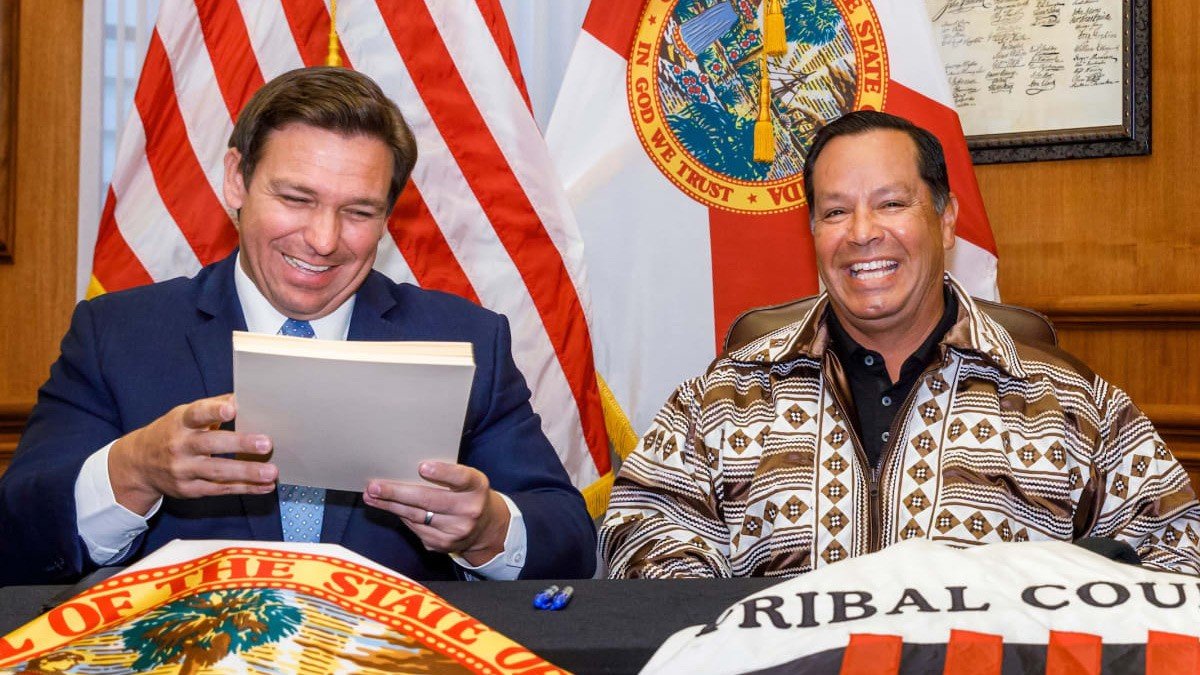Florida sports betting to remain blocked with Court of Appeals ruling unlikely until at least 2023

Bad news for sports bettors in Florida. The United States Court of Appeals for the District of Columbia Circuit is unlikely to rule on the court case blocking the legalization of sports wagering in the Sunshine State this year, a new timetable suggests. Resolution to the matter should not be expected until at least 2023.
The U.S. Department of Interior first announced its intentions to appeal the federal judge’s decision that struck down Florida’s expanded gaming compact with the Seminole Tribe earlier this year. An agreement in place between tribe and state was thrown out and invalidated by U.S. District Judge Dabney Friedrich on November 22, thus halting sports betting in the state indefinitely.
The case against the sports betting plan was filed by West Flagler Associates, operator of Magic City Casino, and Bonita-Fort Myers Corporation, doing business as Bonita Springs Poker Room, against the US Department of the Interior (DOI), the Secretary of DOI Debra Haaland and the Seminole Tribe of Florida.
In her ruling last year, Judge Dabney Friedrich ruled that the compact between the State of Florida and the Seminoles -which gave the tribal nation a monopoly of retail and mobile sports betting- violated federal Indian gaming law, which mandates state-sanctioned gambling to occur on tribal land. The 30-year gaming deal was initially signed in April last year by Gov. Ron DeSantis.

Under the agreement, bettors were allowed to place wagers through mobile devices anywhere within the state, as long as these were processed through computer servers on tribal property. The compact claimed this constituted betting on tribal land, but November’s ruling called this a “fiction,” and discarded the deal.
Now with the DOI moving to appeal the case, the court has released a briefing schedule for the Florida tribal compact sports betting case, with opening briefs from the federal government and the Seminole Tribe scheduled for August 17. At this moment, appellants may raise all issues and arguments for the court to consider. Then, in October, the court will expect the answering briefs: October 3 for the federal government, and October 6 for West Flagler Associates.
October 13 has been set as the date for the amicus brief, and reply briefs from both the federal government and the Seminoles will be submitted on November 14. Oral arguments from both sides will then commence, but a date has not been set yet. What this implies is a ruling before the end of the year is unlikely, meaning sports betting will remain illegal for the near future.
The court has stated it would inform all parties of the date of oral argument and the composition of the merits panel on a later date, yet to be announced. It also strongly encouraged the parties to hand-deliver paper copies of their brief on the date due, reminding counsel that filing the briefs by mail may delay the processing of a brief.
The D.C. Circuit has announced the following briefing schedule in the Florida tribal compact sports betting case:
— Daniel Wallach (@WALLACHLEGAL) July 11, 2022
8/17 - Appellants' Opening Briefs
10/6 - West Flagler Response
11/14 - Appellants' Reply Brief
+ oral argument will be held (TBA).
No decision until 2023. pic.twitter.com/nO1LUdevfQ
Florida’s attempt to legalize sports betting has been one of the most entangled seen yet in the US. Last year saw several attempts from various and opposing parties to permit this form of wagering, all failing to pass. In addition to the discarded Florida-Seminoles compact, an online sports betting initiative financially backed by major sportsbooks FanDuel and DraftKings failed to reach the required verified signatures for placement on the November 2022 ballot.
This operators-backed plan would have legalized sports betting under Florida law at pro sports venues and pari-mutuel facilities, in addition to online betting throughout the state for qualified sportsbooks and tribes with a Florida gaming compact. Sports betting tax revenues would have supplemented a state education trust fund.
Meanwhile, the Seminoles compact called for the tribe to pay the state at least $2.5 billion over the first five years in exchange for sole control over sports wagering, plus the option to add roulette and craps to its operations. The tribe was, in fact, able to debut sports betting in the state last year, but only for a few days before it stopped accepting bets on December 4.
Arguments now being leveraged by the federal government and the tribe in their appeal suggest the judge went too far in her selected “remedy,” contesting Judge Friedrich might have abused her discretion. The case could potentially wind up before the Supreme Court, according to attorneys. Should that happen, sports betting may not take place until 2024, or even 2025.
Lawmakers could seek to remedy this by passing a new compact. However, this is unlikely given this is an election year and the fate of the previous attempt. In the meantime, advocates of mobile sports betting have already announced plans to push again for a referendum before the voters: sports betting could launch sometime in 2025 if a citizen’s initiative is approved in 2024.















































